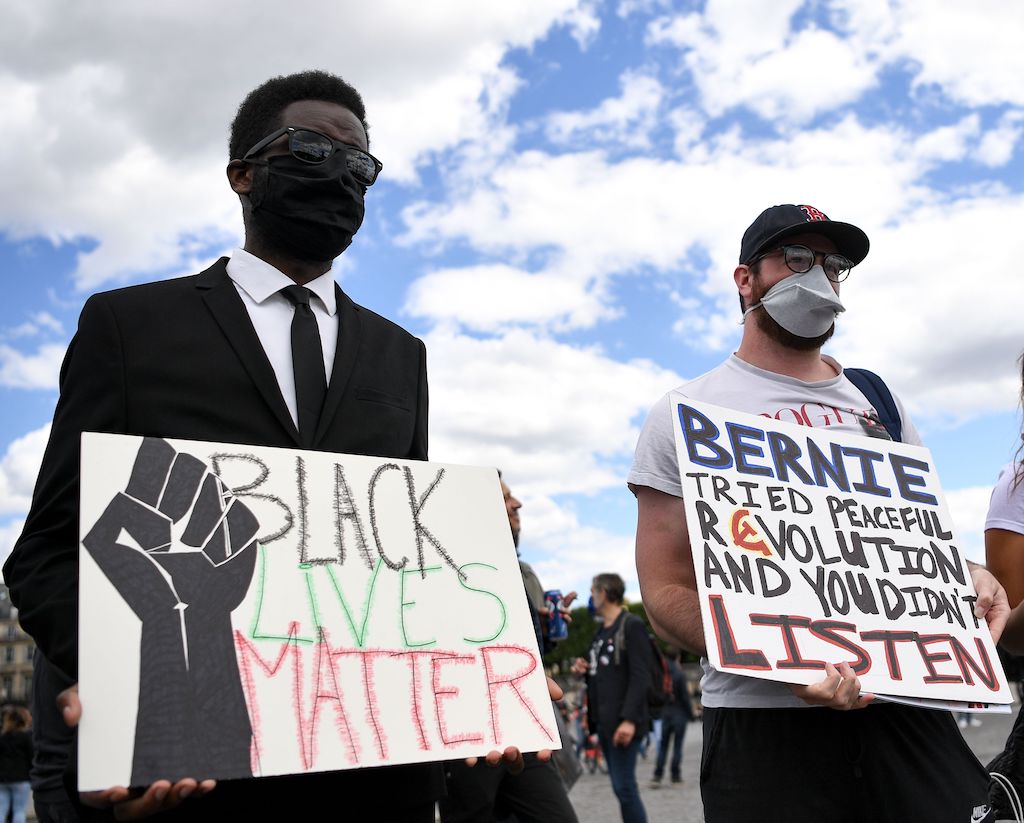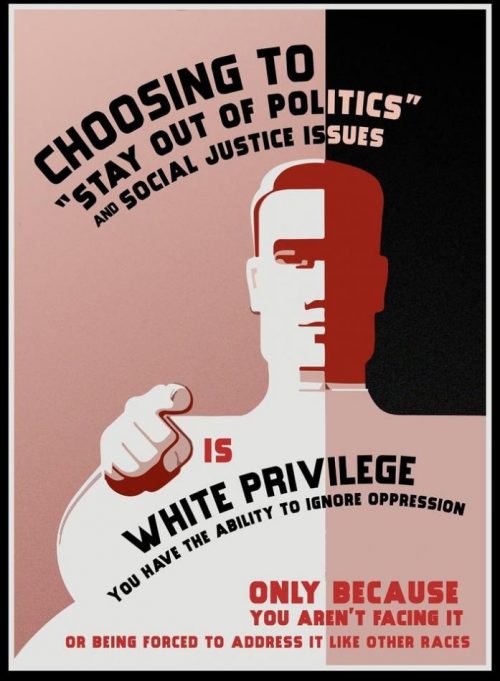Weimar America’s Soviet Summer

I have been posting a lot about my upcoming book Live Not By Lies, though it won’t be published until September, because events of the past ten days have validated its thesis beyond anything I could have expected. It’s a book that tells Americans — especially American Christians — to prepare themselves for “soft totalitarianism” at the hands of  the woke, who are taking over established institutions. It offers lessons from those who endured Soviet, and Soviet bloc, hard totalitarianism. As I was finishing the book this spring, I worried that the thesis might be hard for many Americans to accept.
the woke, who are taking over established institutions. It offers lessons from those who endured Soviet, and Soviet bloc, hard totalitarianism. As I was finishing the book this spring, I worried that the thesis might be hard for many Americans to accept.
After all, though The Benedict Option sold pretty well, there are still many American Christians of more or less traditional beliefs who refuse to accept that the social order that has a place for them has come to an end, and that we have entered a time of post-Christian (and anti-Christian) chaos — a time that calls for a disciplined, hunkering-down strategy akin to the early Benedictines. Nobody wants to believe the worst, no matter what the evidence. In The Benedict Option, the “worst” is not persecution, but the steady erosion of Christian belief and practice under pressure from the dominant post-Christian culture. In my view, the happy-clappy optimism of so many US Christians is completely unmerited, and actually a dangerously naive response to the times. A Christian professor friend told me a couple of years ago that The Benedict Option‘s moment hasn’t yet come, because there are millions of conservative Christians who don’t understand, as conservative Christians in academia and media do understand, how hated Christians to the right of the Episcopal Church are. “If Trump loses, the scales will be ripped from their eyes,” he said.
Maybe so. But I’ve been writing a book that makes an even more extreme claim: that conservative Christians (and all other conservatives, though the book is directed at believers) will actually be persecuted, and forced to profess things they don’t believe, or lose their jobs, their social status, and their friends. There won’t be secret police or gulags, but there will be Chinese-style social credit systems and suchlike; this is why the coming totalitarianism will be “soft.” But it will be totalitarian. One sign of a totalitarian regime is the politicization of everything. I thought about that last night when a reader e-mailed me a screenshot of the message from her local cable provider when she went to pay her bill. The cable company wished to inform its customers, at length, about its righteous stance on Black Lives Matter. The reader said, “I just want to pay my bill,” and lamented that suddenly, in the past week, race consciousness is everywhere.
(What she might have missed is that if it weren’t for race consciousness, it would have been queer consciousness. June is Pride month. I thought every month, and every second of every day, is for Pride, but not now. I assume that the Woke chakras will re-align themselves eventually.)
Anyway, I’ve been thinking all spring about how I would handle interviews this fall, when the book is out, and I have to convince potential readers that things really are as bad as all that. My reckoning was that five years from now, it wouldn’t be hard — but I’m not publishing this book in five years; I’ll be publishing it this fall. What would I do?
Then the past two weeks happened. If you, as a conservative, and especially a conservative Christian, don’t understand how quickly the Woke within institutions — including corporations — can and will force you to say and affirm things you don’t believe on pain of being a jobless outcast, you are willfully blind. There is no way to avoid this. Vote for Trump if you think it will help, but the Great Awokening across American institutions has been happening under Trump, and there’s not a thing he can do about it. Identity politics is the ideology driving this totalitarianism. Soon, the only effective resistance we will be able to offer is that prescribed by Solzhenitsyn, in his 1974 essay “Live Not By Lies,” from which I took the title of my book. It’s message is simple, but radical: you may not be able to stop this rotten, dishonest system from taking over, but you do not have to cooperate with it. As Solzhenitsyn said:
And the simplest and most accessible key to our self-neglected liberation lies right here: Personal non-participation in lies. Though lies conceal everything, though lies embrace everything, but not with any help from me.
We on the Right actually have many more options open to us than did the Soviets in 1974, obviously. Ours is still a democracy, after all. But I am confident that the great majority of Americans will conform, to protect their comforts. I have written a book for those who have the courage not to.
If you still doubt the revolutionary potential of this moment, I invite you to read this interview in the Wall Street Journal, in which Barton Swaim interviews Gary Saul Morson, the professor of Russian literature who teaches at the University of Chicago. They talk about the similarities between America today and Russia as it careened toward the October Revolution. The piece is behind a subscriber paywall, but below, I will post some excerpts.
Swaim begins by comparing these recent riots to the 1992 L.A. riots:
But perhaps the most striking difference is the rationalization, and sometimes full-throated defense, of violence from left-wing elites: the glorification of havoc, the vilification of cops and their middle-class admirers, highfalutin defenses of vandalism. The sense of revolution and class warfare was everywhere this week: the cognoscenti and underclass arrayed against the petty bourgeois shop owners; the elite and those they claim to represent against everybody else.
Gary Saul Morson says he has no special insight regarding police actions and the death of George Floyd. But he does have a provocative thesis about America’s current political moment: “To me it’s astonishingly like late 19th-, early 20th-century Russia, when basically the entire educated class felt you simply had to be against the regime or some sort of revolutionary.”
More:
In late czarist Russia, some political parties and other groups—the Social Democrats, the anarchists, the Marxists—explicitly endorsed terrorism. “The liberal party—the Constitutional Democrats, they called themselves—did not condone terrorism,” Mr. Morson says. “But they refused to condemn it. And indeed they called for the release from prison of all terrorists, who were pledged to continue terrorism right away. . . . A famous line from one of the liberal leaders put it this way: ‘Condemn terrorism? That would be the moral death of the party.’ ”
The lesson seems highly relevant today. “When you’re dragged along into something you don’t really believe yourself—because otherwise you are identified with those evil people, and your primary identity is being a ‘good guy,’ not like those people—you will wind up supporting things you know to be wrong. And unless there is some moral force that will stop it, the slide will accelerate.”
Morson discusses how, in late 19th century Russian culture, to be an “intelligent” (intelligentsia derives from a Russian word) was to be implacably, violently opposed to the ruling order. You might point out to these radicals that they themselves were part of that privileged ruling order. It didn’t feel that way to them. They believed that men with ideas should rule society — and that meant them, and only them. Yuri Slezkine’s recent history The House Of Government tells this story in great detail. Imagine the Yale faculty senate leading a violent revolution, and you’ll get something of it.
Swaim asks the professor:
Is American society, shaped by Protestant Christianity and dominated by a kind of dovish, humanitarian left-liberalism, ever likely to fall into the barbarity of the Russian Revolution? Aren’t we too—I fumble for a word as I formulate the question—soft for that sort of totalizing violence?
“I don’t know,” Mr. Morson answers after a long pause. “I don’t know if that means people won’t go as far as they did in Russia, or if it just means there will be less resistance to it.”
The danger begins, he thinks, when complex social and political problems can’t be debated any longer. “You get into a revolutionary situation because people can’t hear,” he says. “Can there be a dialogue on important questions, or is there only one thing to say about every question? Are people afraid to say, ‘Well, yes, but it’s not quite as simple as that’? . . . When you can’t do that, you’re heading to a one-party state or a dictatorship of some sort. If one party is always wrong and another always right, why not just have the right one?”
This is exactly where we are headed! But it won’t be a Bolshevik system. It will be managerial illiberalism, aided by technology (e.g., a social credit system). One last quote from the piece:
The supposition that America is moving toward anarchy or revolution because we’ve had a week of riots—or three years of bad faith and acrimony, or three decades of polarization—still seems hard to accept. Mr. Morson is careful not to predict the course of events. He uses the phrase “insofar as the Russian example applies” more than once.
But, he says, “we have a major depression, we have terrible fear from the illness, and now we have mass riots in the street, which our leaders do not seem to know how to handle. That’s a very rapid slide from only a year ago. And there’s no reason to think it will slow down. The slide could well continue.”
And history can unfold in unpredictable ways. Who would have guessed 20 years ago, he asks, that the First Amendment’s free-speech guarantee would become passé on the liberal left? “I used to get a laugh from students by quoting a Soviet citizen I talked to once. He said to me, ‘Of course we have freedom of speech. We just don’t allow people to lie.’ That used to get a laugh! They don’t laugh anymore.”
No, they don’t. Read the whole thing, if you can.
In related news, a staff writer at The Atlantic today cheers on what’s happening as like one of the Color Revolutions. They really do believe they’re getting regime change — that a coup is taking place, and that this is a good thing. Notice how that writer, Franklin Foer, speaks of Big Business’s decision to capitulate to the demands of protesters as a sign of revolutionary change.
UPDATE: Ahem.

Subscribe for as little as $5/mo to start commenting on Rod’s blog.